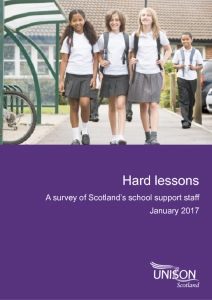 Lack of time, resources and heavy workloads mean support staff are struggling to maintain standards for pupils in Scotland. That is the finding of a wide ranging UNISON report released on Monday 16 January 2017
Lack of time, resources and heavy workloads mean support staff are struggling to maintain standards for pupils in Scotland. That is the finding of a wide ranging UNISON report released on Monday 16 January 2017
In probably one of the biggest surveys of school support staff ever in Scotland, staff report heavier workloads, jobs cuts, lack of educational supplies, and dirtier schools. This is while pupil numbers and education support needs are increasing.
There are 6707 more pupils since 2010 in Scottish schools, but there 1841 less support staff and 1389 less teachers. This report confirms the enormous stress this puts on support staff.
54 per cent of support staff say budgets have been cut, 40 per cent carry out unpaid work to meet workloads, 60 per cent say morale is low, and 80 per cent say workloads are heavier. And services like school libraries are closing. Many report stress from the lack of training and support they receive for the tasks they are asked to carry out – like administering medicines or caring for pupils with challenging behaviour.
The report reveals a dedicated workforce committed to supporting children to reach their potential. Staff skip breaks and work late to meet their pupil’s needs. But they are exhausted, undervalued and under enormous pressure.
Those who took part in survey include classroom assistants, pupil support workers, school administrative and clerical staff as well as cleaning staff, janitors, technicians, catering staff, librarians and library assistants, and home-link workers. The vast majority of those who responded were long term staff who can compare schools now to pre-austerity.
 |
| Carol Ball |
Carol Ball, chair of UNISON education committee said, ‘Cutting hours and not replacing staff means job losses are less likely to get noticed outside school. But these cuts still damage our children’s education inside school. Staff try to maintain a high quality service to give children the best start in life. But this is enormously difficult when schools are short of supplies and staff workloads continue to increase; and libraries, sports lunch and afterschool clubs and music tuition have been cut. And this hurts the poorest kids the most’
Dave Watson UNISON regional manager said, “The Scottish government has targets to reduce inequality in educational outcomes. Sadly, it is children from the most deprived backgrounds that need the access to libraries, or help from librarians. They are less likely to have computers, printers or quiet warm places to do homework. If school libraries have limited opening hours and do not have qualified staff then young people will have less access to information and less support to find the information even when it is open. Similarly how will the Scottish government improving science, technology, engineering and maths education (STEM) with less technicians in our schools to support this type of learning? It takes a whole team to deliver education”
Support staff anxiety when carrying out personal care and medical interventions
The report also highlights a high level of anxiety from classroom assistants who are expected to undertake a range of personal care and medical interventions including: checking blood sugar, insulin injections, catheterisation, tube feeding, and dealing with tracheotomy tubes – all carry high degrees of risk. Many staff feel they have not been given adequate training and risk assessment that these tasks involve. Members also report increased levels of challenging behaviour – and in some cases, violence – in schools.
Carol said, “Enabling children with disabilities to participate in mainstream education is something that we fully support. It is their fundamental human right. But enabling this requires more than warm words and Act of Parliament, we need adequate resources and staff need proper training and qualifictions to support pupils individual needs – whether that is for personal care medical procedures or behaviour.”
